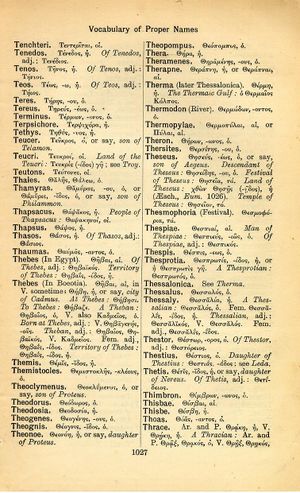Thersites: Difference between revisions
μηδενί δίκην δικάσῃς πρίν ἀμφοῖν μῦθον ἀκούσῃς → do not give your judgement on anything until you have heard a speech on both sides
(3_13) |
mNo edit summary |
||
| Line 1: | Line 1: | ||
{{WoodhouseENELnames | {{WoodhouseENELnames | ||
|Text=[[File:woodhouse_1027.jpg|thumb|link={{filepath:woodhouse_1027.jpg}}]]Θερσίτης, -ου, ὁ. | |Text=[[File:woodhouse_1027.jpg|thumb|link={{filepath:woodhouse_1027.jpg}}]][[Θερσίτης]], -ου, ὁ. | ||
}} | }} | ||
{{Lewis | {{Lewis | ||
Revision as of 17:23, 25 November 2019
English > Greek (Woodhouse)
Θερσίτης, -ου, ὁ.
Latin > English (Lewis & Short)
Thersītes: ae, m., = Θερσίτης,>
I a Greek before Troy, famous for his ugliness and scurrility, Ov. M. 13, 233; id. P. 3, 9, 10; Juv. 11, 31.—Hence, a contemptible person, Juv. 8, 269; and for a calumniator, reviler, Sen. Ira, 3, 23, 3.
Latin > French (Gaffiot 2016)
Thersītēs,¹³ æ, m. (Θερσίτης), Thersite [célèbre par sa difformité et par sa mauvaise langue] : Ov. M. 13, 233 ; Juv. 11, 31 || = homme très laid : Juv. 8, 269 || = une mauvaise langue : Sen. Ira 3, 23, 2 ; Amm. 30, 4, 15.
Latin > German (Georges)
Thersītēs, ae, Akk. ēn u. am, m. (Θερσίτης), Sohn des Agrius, der durch seine Häßlichkeit und seine Lästerzunge berüchtigte Grieche vor Troja, Ov. met. 13, 233; ex Pont. 3, 9, 10 (wo Akk. -ēn). Iuven. 11, 31. Gell. 1, 15, 11 (wo Akk. -am). Auson. perioch. Iliad. 2. – dah. appell., ein Thersites, a) = ein Grundhäßlicher, Iuven. 8, 269. – b) = ein Lästermaul, Schandmaul, Sen. de ira 3, 23, 3 (wo Akk. -am). Amm. 30, 4, 15 (wo Akk. -ēn).

